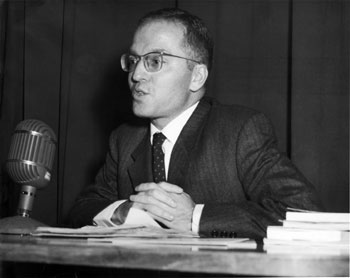
Bernard Sinsheimer
Bernard Sinsheimer, professor of American and European history for the European Division of the University of Maryland from 1954 until his retirement in 1989, died in Paris, France, on February 28, 2011. He was 89. He was a life member of the American Historical Association, which he joined in 1945.
Born in June 1921 in New York City, Sinsheimer spent his early years in Paris, where his father (also named Bernard Sinsheimer) taught music at the École Normale Musique. he He graduated from UCLA in 1942 where he was Phi Beta Kappa. Sinsheimer also held graduate degrees in history and library science from Columbia University.
An active member of the faculty at the University of Maryland, European Division, Sinsheimer was an expert on presidential elections and lectured widely in France and in Africa for United States Information Agency and the Voice of America.
Sinsheimer was so well known for his grasp of history and his focus on accuracy in historical writing that he served as editorial consultant for the American history textbook publishers Harcourt Brace Jovanovich; Prentice Hall; and Holt, Rineheart and Winston.
Sinsheimer received a letter of appreciation from President Charles De Gaulle for helping to correct errors in his memoirs. His comments on timely historical and political topics regularly appeared in Le Figaro, Le Monde, and the International Herald Tribune.
He read everything with an acute eye, it seems, and pounced on errors of omission or commission or expressed an opinion with a brief but telling letter to the editor—whether of the American Historical Review, the New York Review of Books, Perspectives on History, the Journal of American History, or Time magazine, just to name a few (see, for example, his letter commenting about a review of a new book on Woodrow Wilson in the New York Review of Books of May 17, 2001, or his December 7, 1959, letter to Time, nominating Harold Macmillan to be the magazine’s “Man of the Year” for 1960).
Sinsheimer was a champion of free speech and free inquiry, even when this meant that he might become unpopular as a result. He was especially concerned during the late 1960s and early 1970s that the American media was being far too timid on global political issues that did not immediately involve Vietnam. During this period, Sinsheimer pointed out many difficulties between Israel and the Arab nations that he felt were being obscured in the press. He also argued that Francophone West Africa was as foreign to the American political intelligence as the planet Mars.
A frequent participant in international meetings, Sinsheimer was active in the European Association for American Studies, the Society for French History, and the International Congress of Historical Sciences. Sinsheimer was a well-known figure in the intellectual society of Paris. He loved opera and public debate and had an infectious sense of humor.
Sinsheimer is survived by his wife Micheline, two sons—Mark and Philip—and several grandchildren.
John Wennersten
Washington, DC